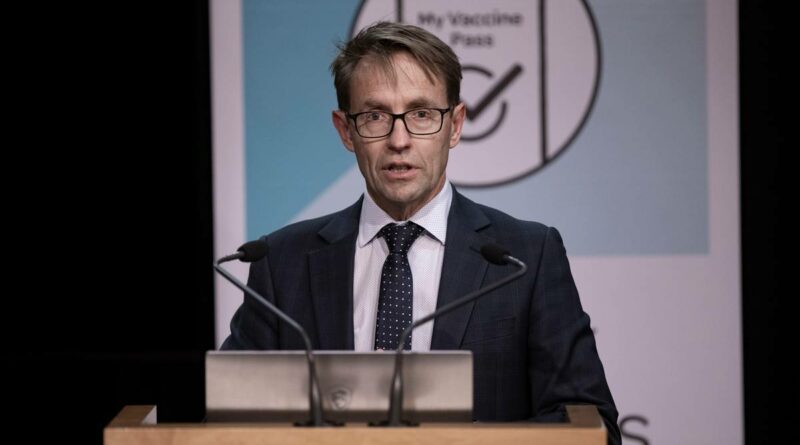Covid 19 Omicron: Rapid antigen test companies tell customers Government taking stock
While the Government spent much of this week claiming it had not been stealing businesses’ rapid antigen tests, the companies supplying those tests to the Government were telling businesses the opposite.
The Herald has confirmed that a minimum of 15 emails from two companies supplying Abbott tests were sent to businesses telling them the Government was diverting all test stock to itself.
New Zealand’s other major RAT supplier, Roche, has also said it told customers the Government had requested its orders be prioritised, although a formal prioritisation request was never made.
One of the emails, from EBOS, an Abbott distributor, has since been retracted by its author.
The other email, from Abbott itself, has been clarified.
The Ministry of Health has said it did not take tests from private businesses.
As recently as February 2, after Deputy Prime Minister Grant Robertson told a Beehive press conference Abbott had confirmed no tests had been taken from them, Abbott’s own customer service team was telling customers the opposite.
An email from Abbott said the company would no longer take orders for its RAT tests because the ministry wanted its orders taken first.
“We have been directed, along with other suppliers, by the NZ Ministry of Health to supply only their orders until they have been filled in full. As a result, we are currently unable to supply the Panbio Covid-19 Ag Rapid Test Device.”
An Abbott spokesperson clarified the email should have only referred to “existing back-orders with the New Zealand Ministry of Health which we will be fulfilling before taking on new orders from other New Zealand customers”.
The email from EBOS to customers warned that “effective immediately we can no longer accept any future orders for Rapid Antigen Tests”.
“The Ministry of Health has issued an order on Monday [24 January] morning to all Rapid Antigen Manufacturers that they are only to supply the Ministry of Health. This has been a directive by Ministry of Health, and we have no control over this decision.”
The email was sent to 14 customers over a period of about a week covering the period from January 24 to February 4.
When EBOS was contacted about the email, a spokesman told the Herald the email was “mistakenly sent out as the sender had not received the correct, authorised message”.
They said they were unaware of any other incidents where a similar email had been sent to customers.
After a further email was discovered by the Herald and put to EBOS, it emerged that 14 emails using the same template had been sent to customers. Two of the recipients of the emails told the Herald no one had been in touch to clarify EBOS’s current position, which is that the Government has not taken the tests.
National’s Covid-19 spokesman Chris Bishop said the Government had been “caught taking rapid tests from the private sector to hide their own incompetence”.
“After initially admitting it, the Government is now engaged in an unedifying display of trying to deny the obvious, against all the evidence,” he said.
In a statement, Roche diagnostics, the supplier of another rapid antigen test, confirmed it too had told its customers “that the Government had requested we prioritise its order with future stock”. However, they added that in the event, no “formal request” was ever made.
Despite Roche saying a request for “prioritisation” was made by the Government, but not formally acted on, ministers are now insisting the Government’s position is that the Ministry of Health only ever wanted its own orders “consolidated” into a single order.
In Question Time on Thursday, Covid-19 Minister Chris Hipkins was asked by Bishop why Bloomfield told a press conference “that forward orders of rapid antigen tests had been, in his words, consolidated into the Government’s stock,” when in recent days the Government had been saying that no tests were consolidated.
Hipkins replied that his “understanding” of Bloomfield’s comments was that “he was referring to the consolidation of the Government’s orders”.
The Herald asked the Ministry of Health whether Hipkins’ interpretation of “consolidation” was correct and a spokesman confirmed it was.
Bloomfield’s comments in a press conference on January 26 suggest a different interpretation. He told media the ministry had spoken with test suppliers and said that “forward orders of tests, that haven’t yet arrived in the country, that those be consolidated into the Government’s stock”.
“So that is there for the whole country, including private businesses,” Bloomfield said.
He added that in a conversation with Abbott he “was asked about the orders that New Zealand-based companies had, and I was asked about whether they should prioritise the delivery to that all-of-government order”.
The comments appear to suggest the definition of consolidation at the time was that the tests from private companies would be consolidated into the Government’s order.
This is quite different from the current definition: that consolidation means simply the Government’s order being consolidated into one – something no Government representative said at the time.
Appearing on Heather du Plessis-Allan Drive after the press conference, Bloomfield said the Government “didn’t overrule orders”.
“The conversations we had with the suppliers were if they had orders to New Zealand-based companies, our expectation would be they would prioritise orders to the Government first,” he said.
“We have asked the companies to prioritise delivery of the Government’s orders,” Bloomfield said.
According to ministers and the Government, this is now incorrect, and the policy is to simply consolidate the Government’s orders together.
Source: Read Full Article


/cloudfront-ap-southeast-2.images.arcpublishing.com/nzme/VLMD6U7I7OK3UEWR7JXM52ANZE.jpg)
/cloudfront-ap-southeast-2.images.arcpublishing.com/nzme/QMNTB5LDJKVHGH6MTR4NJ4KCMU.png)
